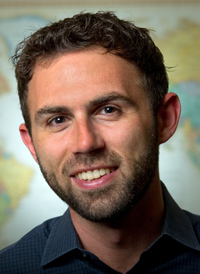Campus News
New book questions effectiveness of peace-building workshops
In his new book, UCSC psychology professor Phillip L. Hammack questions the effectiveness of peace-building workshops involving Israeli and Palestinian teenagers in the United States.

Photo by Matt Cashore/University of Notre Dame

Hammack was recently awarded a National Academy of Education/Spencer Postdoctoral Fellowship.
In his new book, Narrative and the Politics of Identity: The Cultural Psychology of Israeli and Palestinian Youth (Oxford University Press, 2011), Phillip L. Hammack writes of his experiences working with Israeli and Palestinian teenagers who have attended peace-building workshops in the United States.
Hammack is an assistant professor of psychology at UC Santa Cruz and calls himself a “scholar-practitioner.” He both worked for peace groups and spent several years interviewing young people from the Middle East who had returned to their homes after attending workshops that brought them face-to-face in Chicago and Maine.
High hopes
Hammack’s hopes were high when he began the project a decade ago. As a graduate student he was researching the exposure to violence among inner-city African Americans in Chicago when the second intifada began among Palestinian youth in Israel and the occupied territories.
At the time, his research had already begun to take more of an international focus. Hammack recalls seeing an opportunity to use his education and experience in an effort to help bridge the gulf of understanding between Palestinian and Israeli youth.
He took an administrative position with Seeds of Peace, a group that brings young people to the United States for three weeks. Its slogan: “Treaties are negotiated by governments; Peace is made by people.” The theory is known in psychology as the “contact approach” and has been deeply explored by UCSC emeritus professor Tom Pettigrew. The hope is that understanding and empathy can grow from conversation, mutual awareness, and shared experiences.
“I was very optimistic,” Hammack said, believing that it makes sense to work with younger people “before their attitudes hardened.” What he discovered, however, contradicted his expectations and his hopes.
Disturbing discoveries
“What I found was very disturbing in terms of the efforts of these programs,” he said. “It seems like a good idea, and contact can effectively reduce prejudice.” But Hammack said his research found that the programs did not reduce prejudice among the Middle East youth or motivate them to pursue peace and nonviolence.
His conclusions have not made him popular with the organizers of the peace groups where he formerly worked.
Hammack got to know 45 teens from 2003-2007 as they participated in the programs and through follow-up interviews in their homes in Israel and the West Bank. He learned that despite a “halo effect” from getting to know one another the teens encountered resistance to their changed attitudes when they returned home.
Ostracized by friends
They were ostracized by their friends when they tried to communicate what they had learned. They “basically become a traitor to the national rhetoric,” Hammack said. What’s worse, he said, is that some teens react in turn by bending over backward to exhibit hostile attitudes in order to be accepted.
As a psychologist, he attributes some of the attitude to adolescence and the teens’ need to develop a strong sense of national identity, especially in conflict settings.
He argues that the well-meaning programs that seek to bridge the gulf are “very American,” designed to deal with multiculturalism and diversity. They are not designed to deal with the raw conflict that exists in the Middle East.
Hammack has recently returned to Santa Cruz after a year as a visiting fellow at the Kroc Institute for International Peace Studies at the University of Notre Dame. He also was recently awarded a prestigious National Academy of Education/Spencer Postdoctoral Fellowship that will allow him to further his research.
He is working on a follow-up book that examines if there is another kind of dialogue that might prove more effective in reducing tension, an approach that takes into account social justice and power relationships.